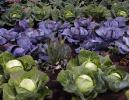Erasmus+ Project: Basic Innovative Skills in Adult Training in Organic Agriculture
- Type Project
- Status Filled
- Execution 2016 -2018
- Assigned Budget 90.081,00 €
- Scope Europeo
- Autonomous community Castilla y León
- Main source of financing Erasmus +
CONTEXT:
- Population studies indicate that in rural areas there are socially excluded groups, such as women who emigrate due to lack of career prospects and the existence of a large number of people over 40 with few or no employment opportunities.
- The European Employment Strategy (EES) proposes the development of new educational models and tools to facilitate adult education; this will promote the training and employment of the "least qualified" and "less advantaged" groups in rural areas.
- Agriculture and rural areas in general are experiencing educational, cultural, social, and economic backwardness, placing this sector at a clear disadvantage compared to urban areas. Many needs lie in the center, blocking a population in dire need of assistance.
- According to the European Fund for Rural Development (ERDF), it is necessary to seek alternative solutions supported by emerging products (organic farming - OA) to improve social and economic conditions, as well as to help settle populations in severely depopulated areas.
- The need to increase the participation rate in adult education remains one of Europe's key objectives, especially in southern European countries and the new EU members.
SIGNIFICANT DATA:
- Unemployment rate in rural areas: marginalized groups 42%, rural women 28%, physically disabled people 23%, young people without professional qualifications 27%, people over 40 years old 76%.
- Lack of specialized curriculum for non-professional adult training in organic farming.
- Lack of adult training tools capable of responding to the identified needs.
Indicators:
- 87% of EU citizens consider ensuring safe food to be an essential role of the CAP (Common Agricultural Policy).
- 89% believe that protecting the environment is essential.
- Organic farming in the EU has increased at an average rate of 500,000 hectares per year. There are currently more than 186,000 organic farming enterprises across the EU.
- In 2011, more than 225,000 organic farmers were registered in the EU.
- Women represent 24% of agricultural entrepreneurs on European organic farms. In some countries, this percentage is higher: Latvia 41%, Croatia 32%, and Italy 30%.
Political priorities:
1. At European level:
a. The new institutional framework of the Lisbon Treaty redefines the budgetary framework with the new "Europe 2020" strategy for EU economic growth supported by the promotion of organic production.
b. The CAP in force from 2014 to 2020 supports the organic agricultural sector.
c. Adult education is a vital component of the European Commission's lifelong learning policy.
2. The proposal reinforces, through training, the principles of the Maastricht Summit (1991) and the EAFRD legislation on agriculture and the environment that underpin national and EU agricultural policies.
3. Experts in rural development and other activities related to the "Europe of Knowledge" have detected, through SWOT reports developed by Rural Development Programs, Incentive Plans, local Agenda 21, etc., that there is no non-vocational training program with a European dimension in the organic farming sector.
- Project coordination and evaluation.
- Development of work tools.
- Training, teaching, and learning activities with 15 people per partner, belonging to the target group.
- Dissemination of results.
1. Develop a Competence Unit (UC) in OA for non-vocational adult training.
2. Promote the development of lifelong learning: teaching, content, alternative practices, and management of ICT (Information and Communication Technologies).
3. Involve the most vulnerable social sectors in a non-vocational adult training process.
4. Incorporate activities into adult training that can help manage new lifestyles: active aging, leisure time management, and therapeutic activities.
- Coordinator/entity name: INSTITUTE OF RESTORATION AND ENVIRONMENT
- Postal address: Aviation Avenue C3 70, 24198 La Virgen del Camino
- Telephone: 987302102
- Instituto De Restauracion Y Medio Ambiente
- AEGEAS EKPAIDEFTIKI
- Agroinstitut Nitra, empresa estatal
- CO&SO Empoli
- CoraNE - Asociación para el Desarrollo de los Municipios de la Frontera Nordeste
- Centro de información







